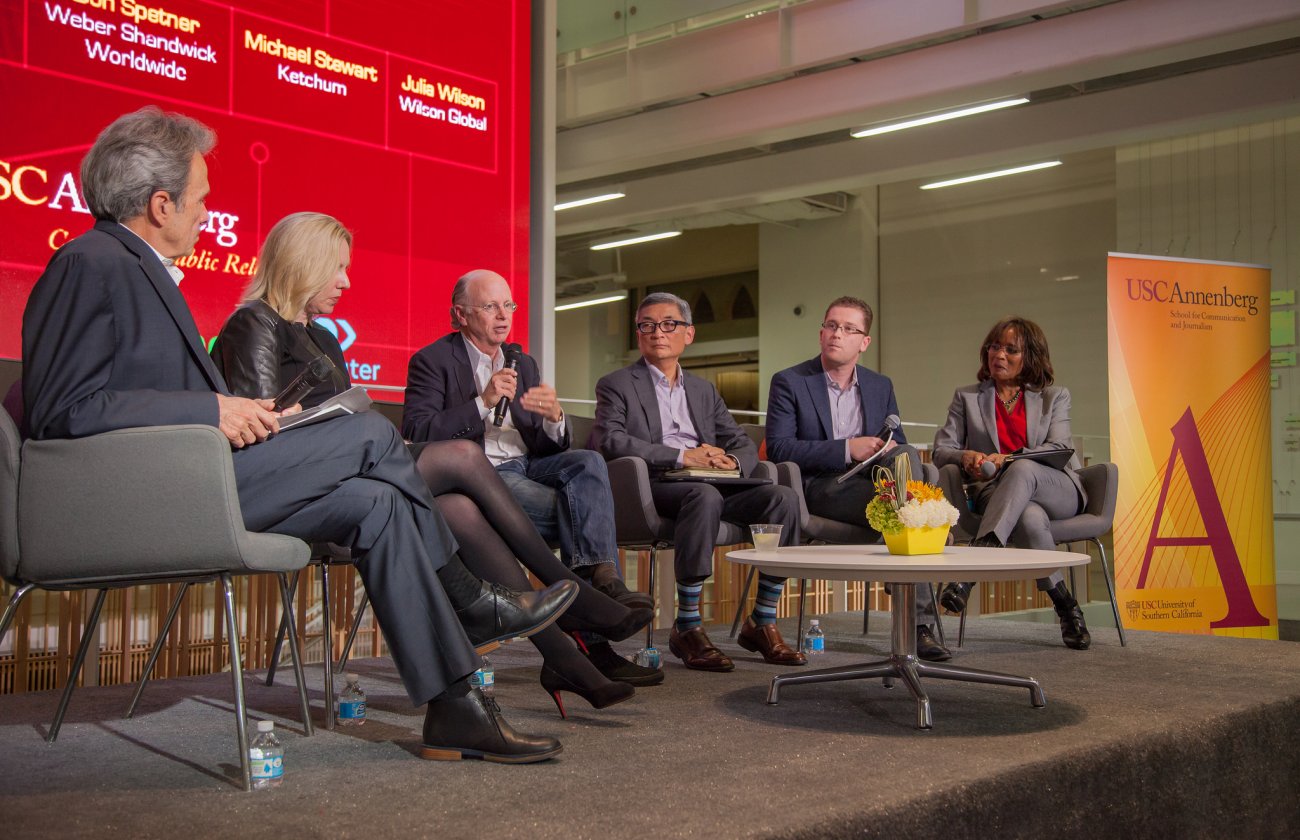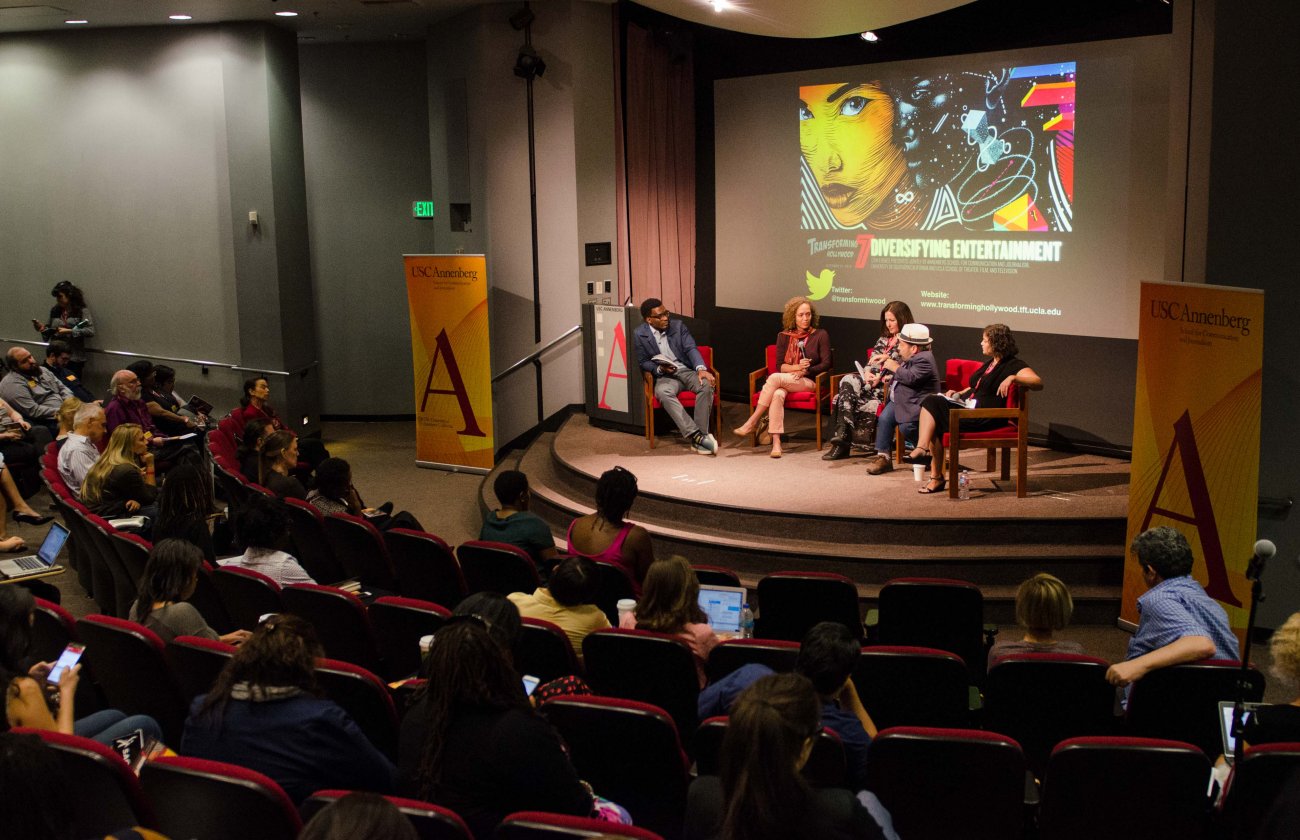By Jeremy Rosenberg
USC Annenberg Executive-In-Residence Mark Lloyd delivered an hour-long lecture Wednesday that was at once sweeping in American historical scope as well as packed with contemporary lessons, ideas, statistics and analysis.
Speaking in front of an audience large enough that USC Annenberg staff had to unfold extra chairs to accommodate latecomers, Lloyd discussed topics ranging from the democratizing Post Office Act of 1792 to the Civil Rights Movement of the 1960s to today’s decreasing percentages of minority and female ownership of television stations.
[Related: Read Dean Wilson’s recent article for The Root, “ The Second Wave of the Digital Divide ”]
Lloyd titled his broad Dean’s Open Forum presentation, "Intersections: Social Justice, Advocacy, Media and Public Policy." He spoke as well during the event about the “complex, interactive, dynamic, interrelated media ecology” that exists during an age where legacy and emerging media co-exist.
“I am going to see if I can provide a bridge between journalism and communications and public relations – not that you need a bridge here,” Lloyd also said near the beginning of his remarks.
The director of New America Foundation’s Media Policy Initiative then proceeded to do just that. The Washington, D.C.-based Lloyd posited that the connective joints between the various USC Annenberg disciplines include public policy and the public interest – as well as an interested, involved and engaged public.
Lloyd foreshadowed the policy-centric direction of his talk early on, projecting a particular PowerPoint slide on the pull-down screen in the Geoffrey Cowan Forum. The slide featured a quote from the man Lloyd called the nation’s most modern founding father, James Madison.
“A popular Government without popular information, or the means of acquiring it, is but a Prologue to a Farce or a Tragedy, or perhaps both,” the Madison quote read. “Knowledge will forever govern ignorance: And a people who mean to be their own Governors, must arm themselves with the power which knowledge gives.”
Lloyd asked audience members to raise their hands if they thought of themselves as having the ability to affect federal policy. Few hands immediately extended. “You have more power than you know,” Lloyd said. “You really do have the power to communicate among yourselves and make a decision about what your government does or does not do.”
By way of example, Lloyd told a story that involved Martin Luther King, Jr., Everett C. Parker of the United Church Of Christ and future Supreme Court Chief Justice Warren E. Burger. The example is known in policy, academic and civil rights circles as “WLBT,” after an offending television station in Jackson, Mississippi.
Inspired by King, Parker and a small team traveled to Jackson and through research, collected overwhelming evidence that the TV station in question was acting in a discriminatory manner and not in the public interest as an FCC license mandates. Parker presented his findings to the FCC – and for the most part saw his findings dismissed.
“Like many Civil Rights advocates at that time, Parker was not satisfied,” Lloyd told the USC Annenberg crowd. So Parker and his church took the Commission to federal appeals court – and they won.
Then-Judge Burger’s opinion revoked the WLBT license and led to the nationwide adaption of “ascertainments” – basically, forms that stations were now required to use to solicit programming feedback from community members.
Working at the time for an Ohio television station, Lloyd sought out ascertainments by knocking on doors at previously ignored locations such women’s shelters and church basements. The end result? “An explosion of local and national programming,” Lloyd said, particularly on Sunday morning. Lloyd himself went on to a position of prominence at CNN.
But across the dial, those ascertainments and community focus would soon lose out in importance to ratings and other issues. Lloyd determined he could do more to promote journalism by becoming an attorney.
The Dean’s Open Forum wasn’t the first time Lloyd had set foot inside USC Annenberg -- and it won’t be the last. Lloyd previously appeared in the Cowan Forum to discuss the release of an FCC-USC Annenberg report, “The Information Needs of Communities.”
Lloyd’s current work as the school’s Executive-in-Residence began Feb. 19 and concludes Feb. 22. His itinerary includes visiting classes at USC Annenberg and the USC Gould School of Law, meeting with student organizations and discussing USC Annenberg’s diversity initiative with school leaders.
“We are fortunate to have an individual of Mark Lloyd's experience and caliber as our special Executive-in-Residence. I know we will all benefit from his wisdom,” USC Annenberg Dean Ernest J. Wilson III said prior to Lloyd’s arrival.
Lloyd’s experience is indeed vast and varied. Lloyd is a distinguished analyst and activist with a broad background in universities, think tanks, government and media-related non-profits. He served as the Associate General Counsel and Chief Diversity officer at the Federal Communications Commission from 2009-2012. At the FCC, he advised the agency on how to promote diverse participation in the communications field, including work on the National Broadband Plan and the Market Entry Barriers Affecting the Critical Information Needs of All Americans.
During introductory remarks at the Open Forum, Dean Wilson announced that Lloyd will return to USC Annenberg next semester to teach a pair of classes, one in Journalism and the other in Communication.
Lloyd also participated last Fall in a lecture blog conversation curated by Dean Wilson. On the site, http://digitaldubois.net, Lloyd joined 13 other prominent national figures in responding to four questions Wilson posed around the larger theme, “If W.E.B. Du Bois were with us today, what would he say about the impact of the ‘Information Revolution’ on communities of color in the United States?” Lloyd’s response is here.









